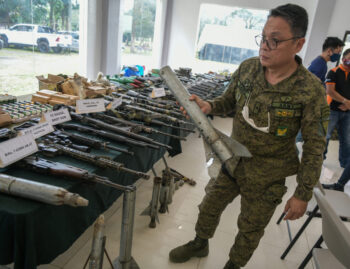MELBOURNE, Australia (MindaNews/09 January) — Spanish forces had initially observed that the indigenous people of this land were of one ethnic stock. Later on however, they would realize that despite the apparent homogeneity in the population, the native inhabitants were actually divided into sub-ethnic groups with each having their own dialect, traditions and rituals. Indeed, until those conquistadores appeared, only autonomous tribal groups distributed among pockets of villages and hamlets existed in these islands. There was no common law and no central authority governing these communities.
Yet these diverse and independent communities flourished and co-existed for centuries before colonization. Their differences never became a hindrance to engagement between them. Of course, engagement covers a gamut of meaning, from cooperation to competition, from warfare to collaboration. This diversity however never came to the point of disintegrating the territory into fragmented independent states or kingdoms such as the case in Malaysia and Indonesia. The loose structure of trading and kinship networks meant that there was always that possibility of harmony among these pre-colonial communities, as in fact there was for many years before Magellan and his Spanish fleet docked in our shores in 1521.
Notably, diversity in the Philippine islands still exists today. Our indigenous identities still run deep despite other peoples’ view that we have become too Hispanized, Americanized, or Westernized. Indeed, we often lament the strong native regional loyalties still apparent among the psyches of Ilokanos, Kapangpangans, Ilonggos, Cebuanaos and so forth. The fact is centuries of colonization, globalization and the internet all have failed to homogenize Filipino identity. But this is not a bad thing at all. As cliché as it sounds, the fact that Filipinos have become a nation of diverse peoples is something to celebrate.
More importantly however, the recognition of our indigeneity should never equate to the fragmentation of the Philippine polity along ethnic or religious divides. National unity and regional diversity are not mutually exclusive realities. In fact, all Filipinos, of whatever aboriginal origin, are equally responsible over matters affecting the nation as a whole. Curiously, there is currently no national mechanism in place where genuine regional representatives can collectively address issues and policies involving the progress and prosperity of the entire country.
One may ask though, can the House of Representatives fulfill this mission? Unfortunately, Congressmen rarely speak in behalf of their constituency when engaging in national issues. The majority, if not all, of the members of Congress do not exactly bring the “regional” view onto the national stage. This observation is evidenced by their predilection in passing laws creating economic zones in their bailiwicks, transforming municipalities in their districts into cities and naming streets and public schools therein after their ancestors. In other words, members of the House of Representatives approach their mandate as simply about satisfying local concerns. Representing their constituency in discourses involving matters of national significance is at the bottom of their agenda. For some, it is not even part of their agenda at all. So the House of Representatives is not a mechanism that can institutionalize both the unity and diversity of our nation.
I submit however that Congress can create such an institution. Lawmakers can enact legislation to create an independent economic and planning agency, as particularly commanded by Section 9 of Article XII of the Constitution, which represents the depth and breadth of Filipino diversity. For example, the governing body of the current National Economic and Development Authority could be re-organized to be comprised of provincial representatives appointed by the governor for a fixed term. However, for this office to effectively function as the national congregation of the various communities in the country, it should not be a mere advisory council. It should be designed to have legitimate policy-making functions as well.
Additionally, Congress can also pass a law regionalizing the composition of the Senate. There is nothing in Sections 2 and 3 of Article VI that prevents lawmakers from pushing for this groundbreaking reform. All the mandated qualifications and the manner of election shall remain the same. The only change shall pertain to the number of electable positions being proportionally divided among the regions. For example, while candidates shall still be elected at large, a third can be required to come from Mindanao, a third from the Visayas and a third from Luzon. Organized this way, the Senate becomes a national body that is not dominated by Filipinos from a particular region. Rather it will be an institution with a nation-wide mandate but wherein authentic regional representation would be palpable and guaranteed.
Indeed, legislating for either of these institutions quite simply establishes an official testament of Filipino unity and diversity. It must be emphasized however, that the purpose of these institutions is not to represent local interests but to guarantee that local voices are represented in promoting national interests. The primary goal of these offices is to ensure that important national policies are formulated through a deliberative process whereby the views and insights of the regions are duly considered. Such a mechanism could indeed engender a genuine sense of ownership from the polity over crucial policy decisions made by the national government as well as a collective commitment to their successful implementation.
These offices could also encourage cooperation and collaboration among local governments. And thus fulfill the aspiration of Section 2 of the Local Government Code to make “self-reliant communities” as “more effective partners in the attainment of national goals.” Under this set up, coherent and comprehensive development planning for the country can finally be achieved.
Most importantly, given the collective spirit imbued in these proposed institutions, its influence in the management of government could also diminish the domination of certain sections of the population, as well as particular geographical areas of the country, in matters pertaining to the nation’s socio-economic development. Indeed, an office of this caliber can stand as a formidable reminder that the state functions for all Filipinos and not just the easily noticeable. (MindaViews is the opinion section of MindaNews. Atty. Michael Henry Ll. Yusingco is a practicing lawyer. He is the author of the book, Rethinking the Bangsamoro Perspective. He researches on current issues in state-building, decentralization and constitutionalism)







